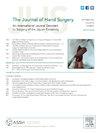内窥镜腕管释放手术中尺神经血管结构的接近:一项尸体研究。
IF 2.1
2区 医学
Q2 ORTHOPEDICS
引用次数: 0
摘要
目的:评价内镜下腕管释放术(CTR)中尺神经血管结构与内窥镜刀片的接近程度。方法:选用10只新鲜冷冻尸体手,采用两家厂家的设备进行内窥镜CTR。从手掌切除皮肤,内窥镜腕管刀片部署在腕横韧带(TCL)的远端边缘。记录刀片靠近尺神经血管束、尺深运动支、掌浅弓和正中神经的位置。松开TCL后,将装置最大程度地转向尺侧,以确定是否可能直接损伤尺神经血管束。结果:TCL末端到掌浅弓的平均纵向距离为13.3 mm(范围8.4 ~ 20.9),到尺运动支的平均纵向距离为10.8 mm(范围4.0 ~ 15.0)。从TCL末端到尺神经血管束的平均横向距离为5.9 mm(范围3.1-7.8),到正中神经的平均横向距离为3.3 mm(范围0-6.5)。在我们的两个标本中,正中神经在切割装置上掌侧半脱位。当将刀片放置在TCL远端边缘时,使用测试装置的任何标本都不可能损伤尺神经深运动支、尺神经血管束或掌浅弓,即使将刀片直接转向这些结构。结论:内镜下CTR对尺神经血管束造成直接损伤的可能性较低。临床意义:这些结果表明,如果在释放腕横韧带之前可以清楚地识别远端,则内镜下CTR不太可能损伤尺神经血管束。控制正中神经对于防止切割装置上的半脱位也很重要。本文章由计算机程序翻译,如有差异,请以英文原文为准。
Proximity of the Ulnar Neurovascular Structures in Endoscopic Carpal Tunnel Release Surgery: A Cadaveric Study
Purpose
To evaluate the proximity of the ulnar neurovascular structures to the endoscopic blade during endoscopic carpal tunnel release (CTR).
Methods
Ten fresh-frozen cadaver hands were used to perform endoscopic CTR using devices from two manufacturers. The skin was excised from the palm, and the endoscopic carpal tunnel blade was deployed at the distal edge of the transverse carpal ligament (TCL). The blade’s proximity to the ulnar neurovascular bundle, deep ulnar motor branch, superficial palmar arch, and median nerve was recorded. Following release of the TCL, the device was turned ulnar to the maximal extent to determine if direct injury to the ulnar neurovascular bundle was possible.
Results
The average longitudinal distance from the end of the TCL to the superficial palmar arch was 13.3 mm (range, 8.4–20.9) and to the ulnar motor branch was 10.8 mm (range, 4.0–15.0). The average transverse distance from the end of the TCL to the ulnar neurovascular bundle was 5.9 mm (range, 3.1–7.8) and to the median nerve was 3.3 mm (range, 0–6.5). In two of our specimens, the median nerve subluxated volarly over the cutting device. When placing the blade at the distal edge of the TCL, injury to the deep motor branch of the ulnar nerve, ulnar neurovascular bundle, or superficial palmar arch was not possible in any specimens using the tested devices, even when turning the blade directly toward these structures.
Conclusions
There is a low likelihood of direct injury to the ulnar neurovascular bundle during endoscopic CTR.
Clinical relevance
These results suggest that injury to the ulnar neurovascular bundle is unlikely during endoscopic CTR if the distal aspect of the transverse carpal ligament can be clearly identified prior to release. Control of the median nerve is also important to prevent subluxation over the cutting device.
求助全文
通过发布文献求助,成功后即可免费获取论文全文。
去求助
来源期刊
CiteScore
3.20
自引率
10.50%
发文量
402
审稿时长
12 weeks
期刊介绍:
The Journal of Hand Surgery publishes original, peer-reviewed articles related to the pathophysiology, diagnosis, and treatment of diseases and conditions of the upper extremity; these include both clinical and basic science studies, along with case reports. Special features include Review Articles (including Current Concepts and The Hand Surgery Landscape), Reviews of Books and Media, and Letters to the Editor.

 求助内容:
求助内容: 应助结果提醒方式:
应助结果提醒方式:


